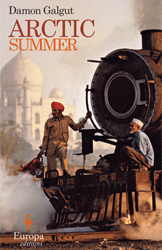When this novel by South African writer Damon Galgut opens, we meet the still-young E.M. "Morgan" Forster, on board a steamship and en route to India for his first visit to the country and to his friend Masood, whom he had coached for his admission to Oxford years ago, and who has since begun to establish himself as a barrister in a small Indian community. From the beginning, the reader understands that this is two narratives packed into a single book: the tale of how what is possibly Forster's most famous novel, A Passage to India, came to be, and the story of Forster's own slow and painful acceptance of his identity as a homosexual man in an era where even for someone less painfully shy and self-conscious, this was anything but good news.

Neither turned out to be easy; both required years. While Masood had begun urging his friend Morgan to write an "Indian novel" long before Forster ever set sail for the subcontinent, the first voyage only planted a few seeds -- the idea of the caves; a mysterious encounter there; a legal process. (It also made clear to Forster that any romantic dreams her cherished of Masood were doomed.) His attention was distracted by writing Maurice, and by the First World War, and by his need to care for his mother. Only later would he return to India, and to the novel -- and to the triumphant culmination of both his writing career and, to a lesser extent, his personal struggle. Breaking free of some of his past torments, Galgut crafts a poignant scene in which Forster comments in passing to Leonard and Virginia Woolf that he doesn't think he's really a novelist and she answers bluntly that no, she thinks that he probably isn't... Sure enough, Forster stopped writing novels at that point, and instead turned to scholarly pursuits.
Galgut has accomplished something impressive in this very biographical novel, chronicling as he does the parallel 'thawing' of a creative process and the construction of a sexual identity. Neither would, perhaps be fully realized: just as Forster never wrote another novel, so he remained deeply private and deeply closeted for the rest of his life. This is a poignant and moving portrayal of a lonely man struggling with that most human need: to be known for who he is, and to be loved. But equally, it's a fascinating portrayal of the creative process, and anyone remotely interested in Forster or the literary environment in which he moved (there are some hilarious scenes featuring DH Lawrence, and some intriguing ones set in World War One Alexandria with CV Cavafy, a favorite poet of mine) will find a lot to relish here.
In many ways, this was reminiscent of Colm Toibin's The Master. I'm not sure I'd say it's of the same caliber, but it's still a moving and fascinating chronicle of the years and experiences that culminated in A Passage to India. Above all, it made me want to run out and read the novel (which is fortunate, since I'll be reading it for my book circle's next meeting in early December...)
No comments:
Post a Comment